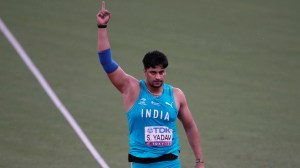Cash-for-query: Somnath sticks to House ruling
The expulsion of 11 MPs involved in the cash-for-question scam has opened up a potential area of conflict between the legislature and the ju...

The expulsion of 11 MPs involved in the cash-for-question scam has opened up a potential area of conflict between the legislature and the judiciary with the Lok Sabha deciding not to respond to the Delhi High Court notice served today.
Sources in the Lok Sabha Secretariat said that the Lower House has decided ‘‘not to respond’’ to the court’s query as has been decided by Speaker Somnath Chatterjee.
Ten MPs from the Lok Sabha were found guilty in a Parliamentary probe by a special committee set up by the Speaker, the lone Rajya Sabha MP’s case was probed by the Ethics Committee of the Upper House. The 11 MPs were expelled on the last day of the Winter session of Parliament. They filed a case in the court, challenging their expulsion on the ground that they have been elected by the people and hence their elected status cannot be cancelled by Parliament.
Though the court refused to grant the MPs interim relief, it sent notices to Lok Sabha and the Rajya Sabha secretariats and the Election Commission.
The Rajya Sabha issue is being taken care of by secretary general in consultation with Chairman Bhairon Singh Shekhawat and Ethics Committee chairman Karan Singh. Lok Sabha Speaker Somnath Chatterjee came out strongly in defence of the parliamentary rules and procedure saying that the judiciary has no role to play.
Expressing his respect for the independent judiciary in other matters, Chatterjee said that this issue—which concerns MPs—is the exclusive domain of Parliament and the judiciary has no role to play in this.
Even the Government which is a recipient of the court notice in the case is likely to uphold the supremacy of Parliament in this matter. ‘‘The Government believes the decision taken by Parliament cannot be challenged in the court of law as per the Constitution,’’ officials said, adding that ‘‘the court may reject the petition following the Constitution letter and spirit’’.
Photos



- 01
- 02
- 03
- 04
- 05




























